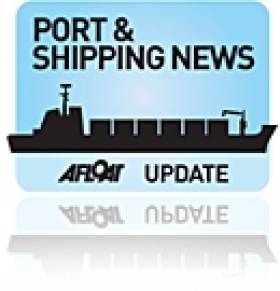Displaying items by tag: Belfast Metropolitan College
Trade, Tonnage and Turnover Up in Belfast Harbour
The principle driver in the ports performance came from the agri-food sector with a record 2m tonnes of grain and animal feed imports. The sector also recorded fertiliser imports alone leap by 32%, reflecting the major investment by the harbour in recent years in the dry-bulk cargo trade.
Roll-on roll-off (Ro-Ro) accounted for a 2% rise to 313,000 vehicles carried, partly due to the introduction of newer larger tonnage on the Belfast-Heysham route.
Belfast Harbour Chairman, Len O'Hagan, said: "Although trading conditions in the UK and Ireland remain weak, the increase in tonnages handled by Belfast Harbour suggests that business confidence is starting to return, albeit slowly.
"Belfast Harbour continues to operate in a highly competitive port sector, but I am pleased to note that the £160m which the Harbour invested in new facilities during the past decade has enabled it to emerge from the downturn with new customers and a presence in new sectors such as renewable energy.
Capital investment in the port worth almost £6m were undertaken during 2010, including the purchase of a new mobile crane, a 10,000 sq ft expansion in logistics space and preliminary works to support the proposed development of an offshore wind turbine terminal for DONG Energy (click HERE). The combined capital expenditure in these projects is in excess of £60m.
Within the ports real estate, projects at the Titanic Quarter progress at the Public Record Office, Belfast Metropolitan College and the core attraction of the 'Titanic Belfast' visitor centre.
Master planning for the 24-acre mixed-use City Quays site adjacent to the Harbour Office was secured. In addition planning permission was lodged for a 230,000 sq ft of space at Sydenham Business Park on the south-eastern fringes of the harbour.
Further upstream closer to the city-centre at the Abercorn Basin, initial work had been completed on a marina where there are more plans for the development of a 250-berth full-service leisure facility.
Next Monday the port's cruise business is to welcome a new cruiseship, the 66,000 tonnes Marina of Oceania Cruises. The 1,250-passenger /800 crew newbuild's arrival to Belfast comes in a year that marks the thirteenth anniversary since the first liner docked in the city. In 2011 over 30 such vessels are due to visit bringing some 50,000 passengers and crew.
- RORO
- Marina
- Port of Belfast
- Titanic
- Belfast Lough
- Belfast Harbour
- Titanic Quarter
- Len O'Hagan
- Belfast Harbour Commissioners
- Cruiseships
- Ports and Shipping News
- Dong Energy
- BelfastHeysham
- Belfast Lough News
- Drybulk
- Abercorn Basin
- Belfast Harbour Chairman Len O'Hagan
- Titanic Belfast
- Marina Oceania Cruises
- Offshore Wind Turbines
- Belfast Metropolitan College
- Sydenham Buinsess Park
- Belfast Harbour real estate
























































